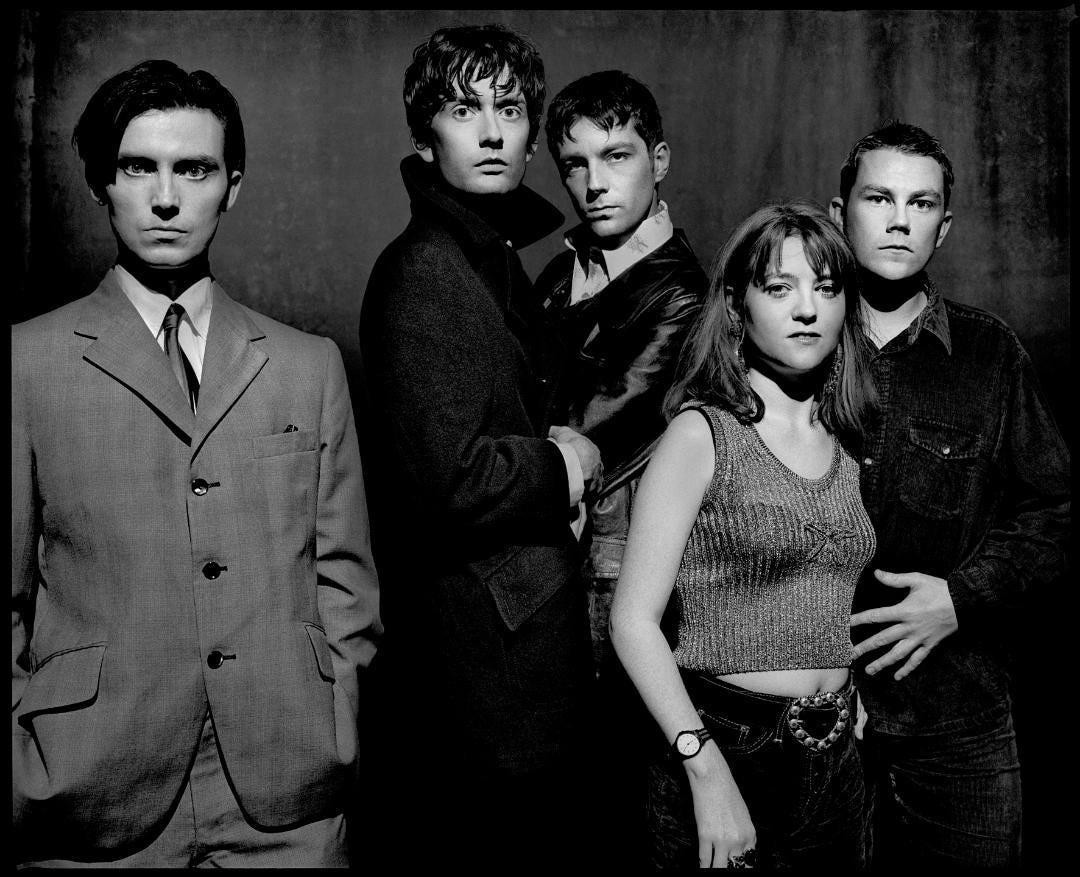Pulp | History of the Band
Britpop and Beyond: Pulp's Defining Decade of Social Commentary and Musical Innovation
Formation and Early Years
Pulp, an iconic British rock group formed in Sheffield, England, navigated through the 1980s with limited success before achieving prominence in the 1990s. The band's early musical style was a unique blend of influences, described as a cross between ABBA and The Fall, showcasing an eclectic mix that drew from electronic new wave, post-punk, and folkish pop. This period was marked by experimentation and a constant search for a unique sound, as evidenced by their early recordings and the varied stylistic shifts in their initial albums such as "It" (1983) and "Freaks" (1987).
Martin suggested this artist for a future Dig Me Out podcast episode. Each month, our Patrons are presented with a selection of albums suggested by listeners and asked to vote for their favorite. The album with the most votes is given another minute in the spotlight. Vote and share your thoughts.
Musical Style and Evolution
By the late 1980s and early 1990s, Pulp had established a well-known lineup. It began incorporating a mix of acid house, Leonard Cohen-styled ballads, and influences from The Velvet Underground, Serge Gainsbourg, Scott Walker, and disco music. This diverse amalgamation helped Pulp carve out a distinctive sound, setting them apart from the Britpop mainstream and aligning them more with an esoteric and varied musical expression.
Discography and Notable 90s Albums
"His 'n' Hers" (1994): This album marked Pulp's breakthrough, achieving widespread recognition in the UK and laying the groundwork for their cult following in the US. The album, released under Island Records, included hits like "Do You Remember the First Time?" and was notable for exploring British social and sexual mores, distinguishing Pulp from their Britpop contemporaries.
"Different Class" (1995): Perhaps Pulp's most celebrated work, "Different Class" epitomized the 90s Britpop scene while also transcending it through its incisive commentary on class and society. The album featured iconic tracks such as "Common People" and "Disco 2000," achieving commercial success and critical acclaim, including a Mercury Music Prize win. Its impact was not only limited to the UK but also made significant inroads into the European market.
"This Is Hardcore" (1998): A departure from the more accessible pop of "Different Class," this album presented a darker, more complex sound. Despite its shift, "This Is Hardcore" was praised for its anthemic songwriting and was another critical success for the band, featuring standout tracks like "Help the Aged" and the title track "This Is Hardcore".
Critical Reception
Pulp's work during the 1990s was met with critical acclaim, particularly for "Different Class," which was hailed as a modern masterpiece. Critics praised the band's ability to weave together catchy pop with sharp social commentary, making them one of the Britpop era's most distinctive and essential voices.
Influence and Legacy
Pulp's influence extended beyond their commercial success, impacting the music industry and shaping the Britpop movement. The band's exploration of class and British identity and their distinctive musical style left a lasting legacy on the genre. Jarvis Cocker, the band's charismatic frontman, became a cultural icon, known for his wit and insightful commentary on British life. Pulp's music continues to be celebrated for its depth, humor, and originality, inspiring new generations of musicians and fans alike.
Conclusion
Pulp's journey through the 1990s is a testament to their resilience, creativity, and keen social observation. From the eclectic experiments of their early years to the polished anthems of "Different Class," the band navigated the decade with a unique blend of style and substance. Their contributions to the 90s music scene were not just about chart successes but also about challenging social norms and offering a nuanced soundtrack to a changing Britain. Pulp's legacy endures, a puzzle piece in the larger story of 90s music that continues to resonate with fans and critics alike.
Sources
Wikipedia
uDiscover Music
MusicianGuide.com





